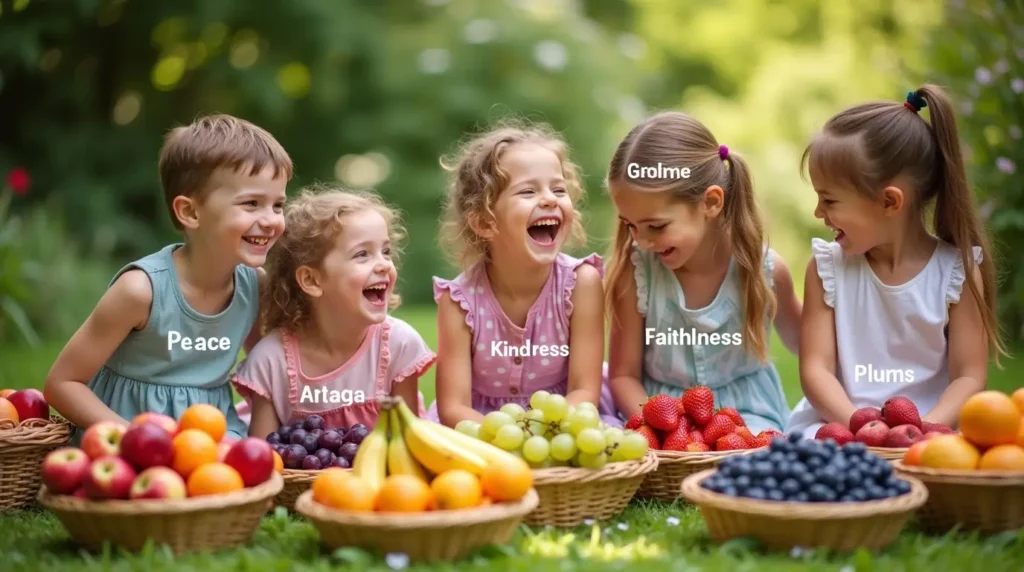Table of Contents
Introducing children to the concept of Fruits of the Spirit for Kids is an inspiring way to nurture kindness, empathy, and strong moral values. These values, found in the Christian tradition, serve as a foundation for character development and guide kids toward becoming compassionate, respectful individuals. But beyond religious settings, the virtues of love, joy, peace, patience, kindness, goodness, faithfulness, gentleness, and self-control are universally cherished, making them relevant for every child. This article provides parents, teachers, and caregivers with practical ways to teach kids about the Fruits of the Spirit in an engaging and age-appropriate manner.
Why Teaching the Fruits of the Spirit Matters
In today’s fast-paced world, children are surrounded by distractions, pressures, and challenges. By grounding them in positive values, you help them develop resilience and inner strength. When kids learn about the Fruits of the Spirit, they gain tools to manage friendships, resolve conflicts, and express themselves with empathy.
Parents often seek creative and fun ways to instill these values. The key lies in making abstract concepts relatable through stories, activities, role-playing, and everyday experiences.

The Nine Fruits of the Spirit for Kids Explained
The Fruits of the Spirit, based on Galatians 5:22-23, are nine core values that act as moral compasses. Here’s how you can explain each to children:
- Love – Caring for others without expecting anything in return. Encourage kids to show love by helping a sibling or being kind to a friend.
- Joy – Finding happiness in simple things. Teach children that joy is not about toys but about enjoying time with family or celebrating small wins.
- Peace – Staying calm even when things don’t go their way. Breathing exercises and quiet time can help.
- Patience – Waiting without frustration. Practice patience while waiting for a turn in games.
- Kindness – Being nice through words and actions. Encourage kids to compliment or share with peers.
- Goodness – Choosing to do what is right. Praise honesty and fairness in daily interactions.
- Faithfulness – Being trustworthy and loyal. Reinforce keeping promises, like finishing chores.
- Gentleness – Speaking and acting softly. Model gentle voices and calm problem-solving.
- Self-Control – Managing emotions and choices. Teach through simple practices, such as saying no to too much candy.
Fruits of the Spirit Made Simple for Kids
| Fruits of the Spirit for Kids | How Kids Can Practice It | Everyday Example |
|---|---|---|
| Love | Help friends and family | Giving a hug to a sad sibling |
| Joy | Appreciate simple moments | Smiling while playing outdoors |
| Peace | Stay calm in disagreements | Taking a deep breath when upset |
| Patience | Wait for their turn | Standing in line without complaining |
| Kindness | Say kind words | Complimenting a classmate |
| Goodness | Do the right thing | Admitting to breaking a toy |
| Faithfulness | Keep promises | Finishing homework on time |
| Gentleness | Speak softly | Using kind words when resolving arguments |
| Self-Control | Manage desires | Eating one cookie instead of many |
Teaching Fruits of the Spirit for Kids Through Fun Activities
Children learn best when they’re having fun. You can create interactive activities that reinforce these values:
- Storytelling: Use short stories or Bible parables that illustrate each Fruit of the Spirit.
- Role Play: Have kids act out scenarios where they practice kindness or patience.
- Craft Projects: Let children create a “Fruit Basket of Values” with drawings of fruits labeled with each virtue.
- Music and Songs: Kids love learning through rhythm and repetition. Simple songs about love or joy stick in their memory.
- Games: Incorporate values into board games or team activities where they practice taking turns, cheering others on, or sharing.

Linking Everyday Life to the Fruits of the Spirit
Children thrive when they see how values apply in daily life. For instance:
- At home, siblings can practice patience and kindness by sharing toys.
- At school, students can use self-control during exams and gentleness when resolving disagreements.
- In community settings, showing love and goodness through volunteering builds compassion.
Parents can also connect the concept to things kids already enjoy. For example, creating parallels between the Fruits of the Spirit and favorite foods, like how eating healthy nourishes the body, while practicing values nourishes the heart. You can even find inspiration from celebrations like Baby Shower Cake Ideas, showing children how joy and love are part of family traditions, or healthy habits like Butternut Squash Baby Food, which symbolizes nourishment and goodness.
Fruits of the Spirit for Kids : Activities to Reinforce Each Fruit of the Spirit
| Fruit of the Spirit | Activity Idea | Learning Outcome |
|---|---|---|
| Love | Write “kindness cards” for family | Learn to express love through words |
| Joy | Gratitude journal | Recognize joy in everyday blessings |
| Peace | Breathing exercises | Develop calmness during stressful moments |
| Patience | Planting seeds and watching them grow | Learn the value of waiting |
| Kindness | Random acts of kindness challenge | Build empathy for others |
| Goodness | Honesty game (telling truths) | Reinforce doing what’s right |
| Faithfulness | Promise-keeping chart | Understand commitment and reliability |
| Gentleness | Caring for a pet or plant | Practice soft, nurturing behavior |
| Self-Control | Candy jar game (saving for later) | Develop delayed gratification |
Tips for Parents and Teachers
- Model the Values: Kids learn by imitation. Be the example they can follow.
- Celebrate Small Wins: Recognize when kids show patience or kindness, no matter how small.
- Be Consistent: Reinforce lessons daily, not only during special activities.
- Encourage Reflection: Ask questions like, “How did you show kindness today?”
- Make It Fun: Remember, children engage more when lessons feel like play.

Fruits of the Spirit in Different Settings
- At Home: Morning routines can include a short affirmation about love or joy.
- At School: Teachers can build classroom activities around teamwork and empathy.
- At Church: Sunday school lessons can highlight stories that illustrate the Fruits of the Spirit.
- In the Community: Volunteering together teaches goodness and faithfulness in action.
Fruits of the Spirit for Kids : A Lasting Legacy
The Fruits of the Spirit for Kids are more than abstract virtues—they are practical tools for daily life. By teaching kids these values in a loving, interactive, and relatable way, you empower them to grow into caring and responsible individuals. Whether through storytelling, crafts, or simple family conversations, the journey of nurturing these virtues leaves a lasting impact. Like a fruit tree that grows stronger with care, children’s character flourishes when rooted in love, patience, and kindness.



